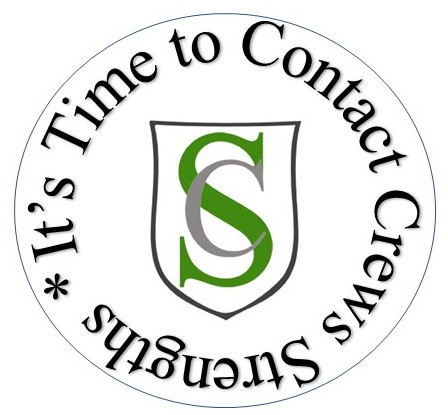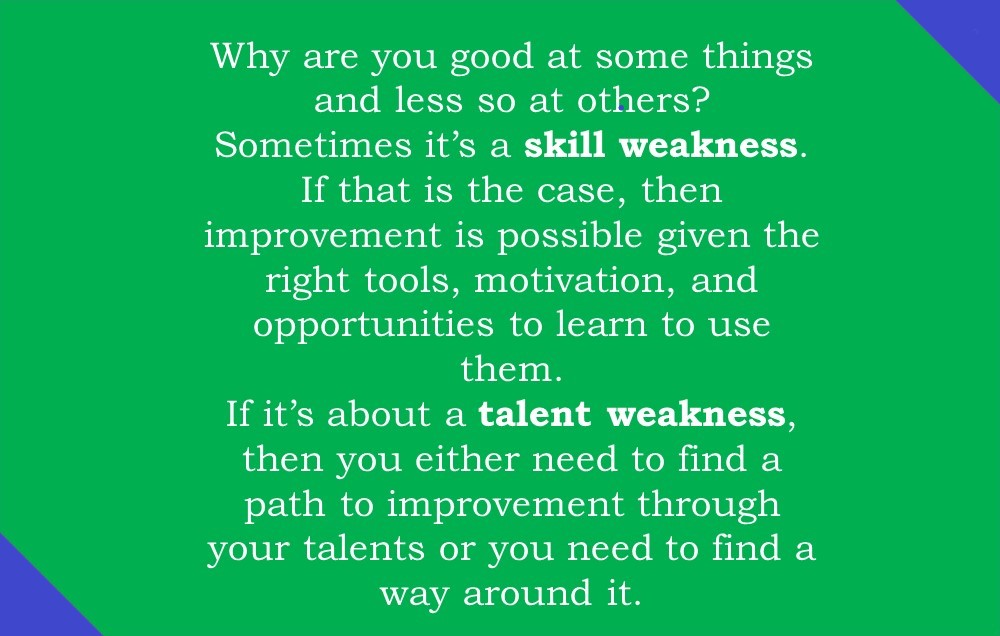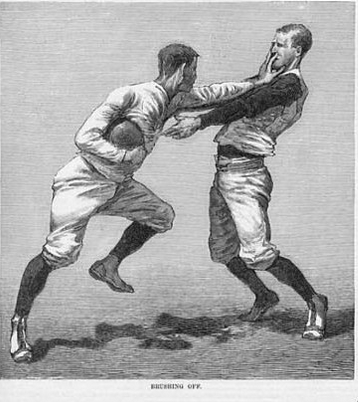
If there are Strengths, then there must be weaknesses. Otherwise, you would always be succeeding. I feel confident in saying, none of us, is always succeeding. Even if your track record is very good, there are ways in which you can improve.
So, what are you going to do about your weaknesses?
First, what do you think is a weakness?
For this article’s purpose, let’s think of two types of weaknesses:
- Talent weaknesses
- Skill weaknesses

Not being able to run a marathon, the week after you start jogging, is not a talent weakness. It is the lack of developed athletic skill. Not being able to understand what is going on in a Wagner opera, performed in the original German, is not a talent weakness. It is a lack of language or musical knowledge. If you have the desire to run marathons or comprehend Lohengrin, then you might want to apply effort to develop that ability. That is, if you have the inclination to run marathons or appreciate opera. How good you get or care about getting at either, is about your talents and ultimately about your Strengths.
Not knowing how to do something is a skill weakness. Skill weaknesses may be corrected by expanding your horizons and expending energy to learn something new or improve a skill.
Conventional practice is to expend your energy to overcome your weaknesses. Have you ever had your annual evaluation and been told you are great at A, B, and C, but need to work on X, Y, and Z. A year passes and the ritual repeats itself, excellence at A, B, and C and coming up short on X, Y and Z. You might be told to stop working on B because you are obviously amazing at it, but if you don’t get your Y and Z together, there may be consequences. By the time this “edifying” experience comes around again, you’re A and B are getting weaker, and your X, Y, and Z are only marginally better. By now, you hate your job and your boss and have mixed feelings about the guy who fills the snack machines.
Why?

Why are you good at somethings and less so at others? Sometimes it’s a skill weakness. If that is the case, then improvement is possible given the right tools, motivation, and opportunities to learn to use them. If it’s about a talent weakness, then you either need to find a path to improvement through your talents or you need to find a way around it.
The Strengths’ philosophy recommends that you concentrate on your Strengths and work around your weaknesses.
One sign that you are not working in your Strengths, is exhaustion from trying to do a particular type of task or doing a task in a particular way. Conversely, working in your Strengths is energizing.
My father-in-law was a successful, brilliant, and nimble small businessman. He owned a heavy equipment business that had evolved from a trucking company. He was able to shift his business multiple times to meet conditions changing from domestic to international business and back depending on market conditions. He sought out new areas of business, like learning the ins and outs of the logging equipment business to add lines of equipment and find new opportunities. His talents lay in areas of ideas, adaptability, and developing relationships.

He was also disorganized, prone to jotting down everything on multiple yellow legal pads, while jumping from one great idea to another. The man would have been a failure without a secretary. (That is what we used to call people who handled office administration and actually kept offices running). She transcribed and clarified his chicken scratch handwriting and put order to his genius. He was able to concentrate on his strengths, improving knowledge and skills when necessary and working around his weaknesses.
Gallup defines a weakness as anything that gets in the way of near perfect performance. You may think of a weakness as the opposite of a strength. That is self-defeating. For example, people with the Deliberative Strength tend to slow things down by looking for the pitfalls and being aware of what can go wrong. They want the t’s all crossed and the i’s all dotted. It can be a very valuable Strength to avoid problems.
Conversely, the Activator Strength wants to get others started and wants to do the same themselves. Activators act as spark plugs and bugle blasts calling everyone to move forward. When the ball needs to get rolling, Activators tend to the ones who give it a shove or three.
Deliberative and Activator seem like opposites in this example. So which one is the weakness? The answer is neither one. Success comes from positively applying the Strengths that you have.
A weakness is anything that gets in the way of amazing performance. Amazing performance for a high Deliberative is using their superpowers to find the mines in the minefield and the potholes in their path. Amazing performance for a high Activator is successfully rallying the troops and getting the charge going. If you do not have the Deliberative Strength, your “near perfect performance” is not going to be scouring minefields.
Sometimes what the Deliberative needs is someone with a Strength like Activator, to help them get things moving. Sometimes the Activator needs someone with Deliberative to help them avoid taking off without proper preparation and soberness. This is how each of them can work around their weaknesses.

When we think of star athletes, we think of talents, strengths, and agility. On an American football team, like almost all team sports, different players have different contributions to make to the effort. The quarterback calls plays, throws or hands off the ball, and occasionally runs with the ball. Offensive linemen use size and muscle to give the quarterback time to execute. Receivers use speed and finesse to position themselves to receive the ball. Running backs use dexterity to weave through the lines. The defensive players also apply skills and talents specific to tasks they need to perform.
A quarterback who fails to tackle an opponent who recovers a fumble is not suffering from a weakness. He is not talented in that function. In fact, doing so, might be foolhardy, reducing his effectiveness by injuring himself trying.
The quarterback hones his skills by practicing and studying his craft – passing, play calling, rolling out of the pocket. The greats adjust as they go modifying to compensate for age and injuries.
Occasionally a defensive player, intercepts a pass or recovers a fumble and must shift his inclination (talent) to do something different. These moments are celebrated but should he fail to score on that play, it is unlikely to be considered a failure or a weakness. He isn’t wired to make offensive plays.
Each player adjusts to the situation around him as players block or fail to block, receivers are forced to change routes and weather and wind influence each moment of the game.
You have a team of Strengths within yourself. Each one influencing and affecting every other one.

When an orchestra plays, there are times when one particular instrument plays and others remain silent. At other times, various instruments play together in harmony creating a greater, richer sound than is possible for any one instrument. Just because the contrabassoon or piccolo isn’t played at a particular time, it does not mean they do not matter, it means they didn’t belong at that moment in that piece of music. When you play Concerto for Piccolo and Contrabassoon: I. Allegro giusto by Damian Montano, the piccolo and contrabassoon take center stage. If, however, the glockenspiel player suddenly decides that he needs to be heard and jumps to the front of the orchestra, chaos and possibly hilarity occur, but not music or at least not tuneful music. Your Strengths’ melody comes from applying the right Strengths when applicable and letting other Strengths just mark time until their moment in the spotlight.
The Strengths’ philosophy says that Strengths do not just exist, but that they are attributes that you can work to develop. Strengths are similar to the muscles you develop to succeed at a sport. You develop them not to just be large, but to be efficient, flexible, and toned to apply them to particular situations.

Weaknesses can result from a misapplication of Strengths. Maximizer is a Strength which is about taking things up another notch. It is about making good things great and great things amazing. Misapplying it can be about “gilding the lily”. There are times when it is necessary to move on, to stop exerting additional effort. It could be time to Maximize a different project. Sometimes deadlines mean that it is time to stop maximizing and get the project submitted.
A golfer needs strengths to send a ball down the fairway. But to be effective, she needs to calculate the amount of muscle power that she is capable of exerting through a particular club, taking the topography of the course, wind and weather and her level of exhaustion as the game goes on. Merely whacking the ball as hard as possible is as likely to end in failure as it is in success. Aiming your Strengths is much the same.
The Strengths philosophy is “Lean into your Strengths and work around your weaknesses”. Understanding whether you are dealing with a talent weakness or a skill weakness, will help you determine your best course of action. Skill weaknesses are shortcomings you may be able to deal with directly. Talent weaknesses are things about which you may need to change your approach, trying a variety of your Strengths until you find the right tool set. Alternatively, you may need to find other people with the required Strengths to help overcome things you are not wired to thrive at naturally.
Thank you
Thank you for continuing to read these posts. I trust that you find them valuable.
If you found this post to be of value, please like it and comment on it on LinkedIn at this location.
Helping people stop hating their jobs by finding meaningful, purposeful, engaging work is my goal. If you need help working around your weaknesses, please contact Crews Strengths. If you are considerng a job search, creating a resume, deciding to make a career move or figuring out how to put your Strengths to work, please reach out.